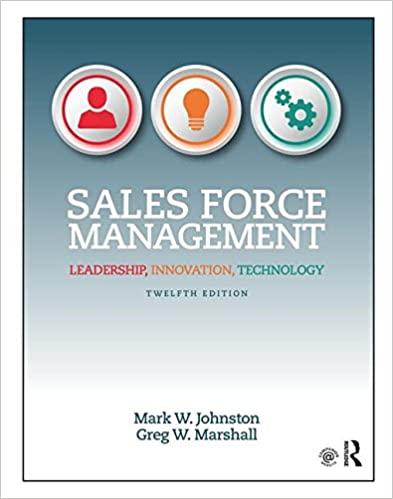Lasting Impressions is a small Orlando, Florida, company that provides trade-show marketing solutions to customers of all
Question:
Lasting Impressions is a small Orlando, Florida, company that provides trade-show marketing solutions to customers of all sizes. The company offers to design a plan for trade-show exhibiting from start to finish, including developing a pre- and postevent marketing plan and branding strategy, creating the exhibit booth and corresponding collateral support materials, packaging and shipping all trade-show materials, and providing boothmanship training services.
Founded by CEO Rajiv Dembla in 2006, the company focuses its own sales efforts on customers within the state of Florida and has a team of four account executives—Mary Beth, Suzanne, Franco, and Syl—who act as the salespeople for the organization. Rajiv relies on the same territory design that he has for the past several years, in which he divides the state geographically into four equal-size regions, and the account executives are responsible for the cities within their respective region.
Rajiv is not an especially quantitative manager by nature, but he did acknowledge the need to do a sales forecast for the upcoming 2016–17 fiscal year. He used the sales force composite method by asking his account executives how much each expected to sell during the coming year and then totaling those estimates. This type of method has worked for the company in the past, but Rajiv is concerned that Syl acts in the spirit of the marketing adage “underpromise and overdeliver” by intentionally underestimating his sales expectations so that his quota will be lower. To be safe, Rajiv also determined the sales forecast by taking a moving average of the previous four years of sales (see Table FY 2016–17 Forecasted Sales and Quotas).
Based on an average of these two sales forecasts, Rajiv set out to develop the yearly sales quota for each of his account executives. As he usually did, he kept the quota as simple as possible by basing it on gross dollars brought into the firm from sales, and he made it equal for each account executive. To ensure that his sales team is aggressive, he set the quotas slightly higher than the forecasted sales. As further motivation, Rajiv put 25 percent of each account executive’s compensation in the form of a bonus for meeting or beating sales volume quotas.
John Cook, Rajiv’s executive assistant, is more sensitive to the needs of the staff than Rajiv and tends to be the one that people talk to freely. Mary Beth complains to him privately, “This quota system does not reward—and even punishes—me for doing what I do best, building relationships with customers through in-person consultations, field demonstrations, and attending trade-show events to ensure everything goes smoothly.” She finds these activities invaluable for serving the customer and keeping her pipeline of business full in the long term, but they do not necessarily generate sales volume in the short term.
While Suzanne tells John, “I have no problem with the quota because my territory includes the home city of Orlando. I know all of the businesses there and have no problem generating sales,” Franco comes to John upset. His region includes Tallahassee, Pensacola, and the rest of the Florida Panhandle, which is more rural, is farther away from home, and has fewer businesses. As a result, he says, “I am miserable! I can’t meet these unfair quotas!”
Syl tells John, “I have the same problem generating sales at times in my north-central Florida territory because there are fewer large cities. But,” he whispers with a smile, “I don’t worry about it. I recommend more expensive trade-show supplies and services to my customers at the end of the fiscal year to boost my short-term sales. And if I need more sales to meet my quota, I just do some creative accounting and record sales numbers for this year which should come due at the beginning of next year. It works every time.”
John is in a quandary. He normally keeps the staff complaints confidential, but in this case he feels like he needs to tell Rajiv that all is not well at Lasting Impressions.
Questions
1. Based on the facts given, evaluate Rajiv’s territory design. What other basic control unit might Rajiv have used besides cities? Why?
2. What other forecast method(s) should Rajiv have used besides the sales force composite moving average? Why?
3. What type of sales quota did Rajiv use? Did he set the appropriate quota level? Why or why not?
Step by Step Answer:

Sales Force Management Leadership Innovation Technology
ISBN: 9781138951723
12th Edition
Authors: Mark W. Johnston, Greg W. Marshall





